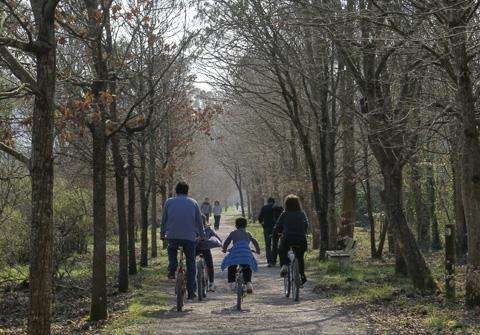Designating biosphere reserves improves the life quality of the citizens

Initially, protected areas had a single, major aim which was to protect biodiversity; today, by contrast, the promotion human well-being is also an important aim. The relationship between the environmental conservation and its socioeconomic and cultural impact has been fiercely debated. Urdaibai in the Basque Country was designated a biosphere reserve in 1993, and certain activities were banned and resource exploitation was restricted, which has been hotly debated among locals. Many Urdaibai inhabitants do not agree with the restrictions, whereas others feel that the measures do not go far enough to guarantee conservation.
To shed light on this debate, Nekane Castillo, a researcher in the UPV/EHU's Department of Plant Biology and Ecology, has conducted research into the socioeconomic evolution of the Urdaibai Biosphere Reserve to find out whether or not the designation of biosphere reserve has been advantageous for the Urdaibai population. In her research she analysed and compared several variables in Busturialde and Uribe Kosta ever since the steering plan was approved "because these two districts are close to each other and because they share similar features." Specifically, three types of variables were considered: variables relating to land use (agricultural land, urban land, pine plantations, eucalyptus plantations, autochthonous forest, etc.), socioeconomic variables (employment and unemployment, GDP, population, etc.) and cultural variables (use of the Basque language, level of education, etc.). In addition, an environmental sustainability index was calculated on the basis of the water consumed, the waste materials produced, etc.
The socioeconomic and cultural variables of the two districts are the same
After making a statistical examination of all these variables, the researchers concluded that the two districts have experienced a similar trend. "Firstly, traditional agricultural activities have been abandoned and the pine plantations that are so detrimental to the environment have diminished, and in their place, urban lands and local species have expanded," explained Nekane Castillo. Secondly, the researchers have noticed that the tertiary sector linked to tourism has grown and so have well-being (income, gross domestic product, further education and employment) and sustainability. However, the researcher says, "On the whole, despite the fact that half of the surface area of the Urdaibai Biosphere Reserve consists of pine plantations, it offers better conditions for conservation and better rural area conditions than Uribe Kosta, while the socioeconomic and cultural variables remain similar.
"That means that the designation of biosphere reserve has not been detrimental for the citizens. It guarantees the conservation of the district and that may have boosted the socioeconomic and cultural development in the area. Even though some changes need to be made to replace the pine forests by autochthonous ones and to encourage agricultural activity, the designation of protected area has achieved the aims in terms of sustainability, and we can say that the life quality of the population in the district is increasing."
More information: Nekane Castillo-Eguskitza et al, Urdaibai Biosphere Reserve (Biscay, Spain): Conservation against development?, Science of The Total Environment (2017). DOI: 10.1016/j.scitotenv.2017.03.076
Journal information: Science of the Total Environment
Provided by University of the Basque Country



















